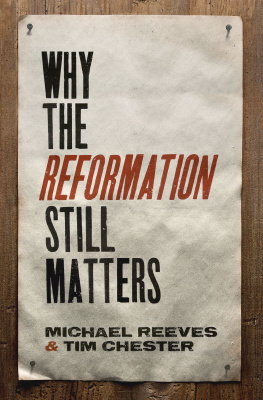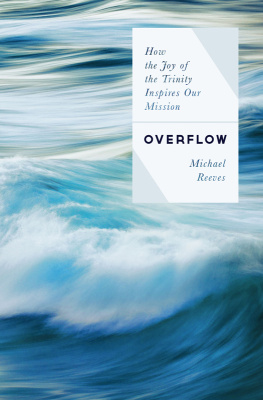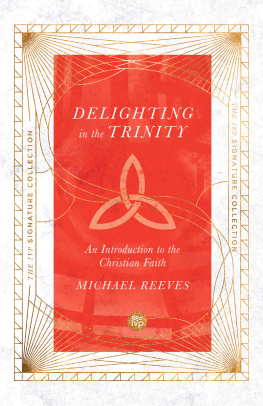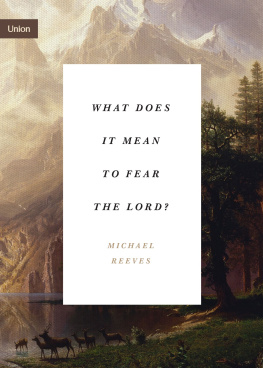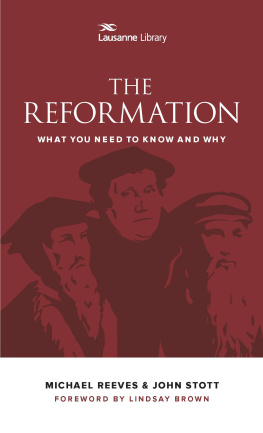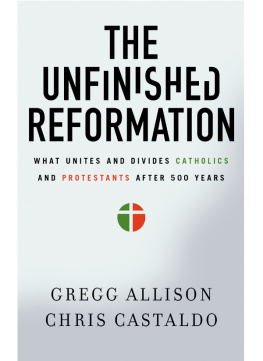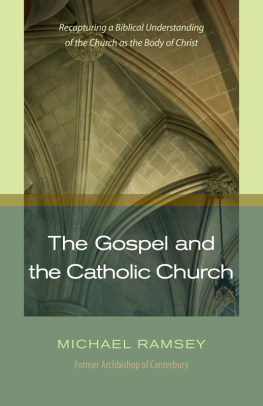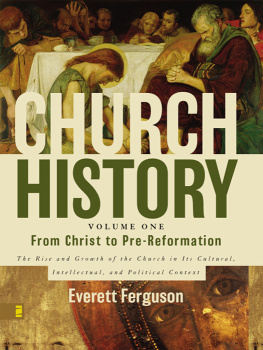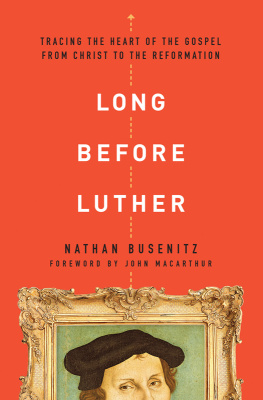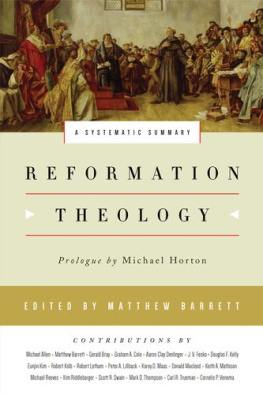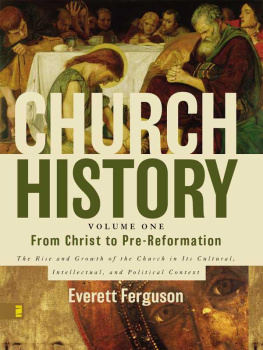Table of Contents
Landmarks
abortion,
actual grace,
Adam, sin of,
ad fontes ,
adoption,
alien righteousness,
Anabaptists,
on church discipline,
And Can It Be? (hymn),
Apocrypha,
Aristotle,
assurance,
Augustine,
autonomy,
Bach, Johann Sebastian,
Balaams donkey,
baptism,
Baptist movement,
believers baptism,
Benedict XVI, Pope,
Bernard of Clairvaux,
Bible, as word of God,
boasting,
body of Christ, ubiquity of,
Bondage of the Will (Luther),
Bonhoeffer, Dietrich,
Brunner, Emil,
Bucer, Martin,
Bullinger, Heinrich,
Bunyan, John,
calling,
Calvin, John,
on adoption,
on Anabaptists,
on the church,
on church discipline,
on happiness in God,
on imputed righteousness,
on justification,
on Lords Supper,
on love of Christ,
on preaching,
on purgatory,
on union with Christ,
on Word and sacrament,
on Word of God,
on work of Christ,
Catechism of the Catholic Church (1992),
Catharer ,
Catherine of Aragon,
celibacy,
Charles V, Emperor,
cheap grace,
Christ alone,
Christian life, as power in weakness,
church
authority of,
and the cross,
as gathered community,
gospel continuity of,
holiness of,
importance of,
institutional continuity of,
as mother,
no salvation outside of,
visible and invisible,
and world,
church discipline,
clergy and laity,
cocreation,
comfort,
communion with Christ,
communion with God,
confidence,
consubstantiation,
contemplation,
coram Deo ,
Council of Constance (14141418),
Council of Trent (15451563),
councils and creeds, as subordinate to Scripture,
covenant, Lords Supper as,
Cranmer, Thomas,
cross,
denominations,
discipleship,
double justification (Bucer),
Eastern Orthodox Church,
ecclesiola in ecclesia ,
Eck, Johann,
education, preaching as,
Edwards, Jonathan,
Elgar, Edward,
English Reformation,
enjoyment of God,
Enlightenment,
Erasmus,
eschatologies of glory,
eternal life,
Eucharist,
as sacrifice,
evangelical Anabaptists,
evangelicals, on grace,
Evangelicals and Catholics Together ,
everyday life,
excommunication,
ex opere operato ,
experience,
explicit faith,
external righteousness,
faith, and knowing God,
faith alone,
fall,
fanaticism,
Farel, William,
fear of death,
First Zurich Disputation (1523),
formalism,
formal principle of the Reformation,
Fourth Lateran Council (1215),
Frankfurt Book Fair (1527),
Gemeine (community),
Geneva,
George, Duke,
glory, human notions of,
glory of God,
good works,
gospel,
defines the church,
and sacraments,
and union with Christ,
grace,
infused through sacraments,
like a marriage,
in medieval Catholicism,
as relational,
in Roman Catholicism,
as unmerited favor,
grace alone,
grace without Jesus Christ,
Great Awakening,
Great Commission,
Grebel, Conrad,
growth in grace,
habitual grace,
heart, transformed by Spirit,
Heidelberg Catechism (1536),
Heidelberg Disputation (1518),
Henry VIII, King,
hidden revelation,
higher criticism,
Hofmann, Melchior,
holiness,
holy orders,
Holy Spirit,
and adoption,
as giver of life,
mediates presence of Christ,
and the Reformation,
hope,
host, bread as,
humanist movement,
humiliation,
humility, in reading the Bible,
Hus, John,
hymnody, justification in,
idolatry,
image of God,
imparted righteousness,
implicit faith,
imputed righteousness,
in Christ,
individualism,
indulgences,
infant baptism,
Jan of Leiden,
Jerome,
Jesus, Your Blood and Righteousness (hymn),
Jesus Christ
humanity of,
as incarnate Word,
as our reward,
as the Vine,
Joan of Arc,
John Paul II, Pope,
Johnson, Marcus Peter,
joy,
judgment,
justice of God,
justification
as article by which church stands or falls,
as declaring righteous,
by faith alone,
as forensic,
and good works,
importance of,
as main hinge on which religion turns,
and sanctification,
secularization of,
of the ungodly,
kingdom of God, given to little flock,
Kirche ,
knowing Christ,
knowledge of God,
through Holy Spirit,
knowledge of self,
Latimer, Hugh,
Lent,
Leo X, Pope,
Lewis, C. S.,
liberal theology,
liberation, grace as,
long-suffering,
lusts of the flesh,
Luther, Katharina von Bora,
Luther, Martin,
on Anabaptists,
as Augustinian monk,
on Christ,
on the church,
on customs of the church,
excommunication of,
on good works,
on grace,
on Holy Spirit,
hymn of,
on justification,
on Lords Supper,
on the Mass,
on preaching,
on priesthood,
on the Reformation,
on righteousness of Christ,
on sacraments,
on sacrifice,
on simul justus et peccator ,
on sin,
on theology of the cross,
tower experience of,
on union with Christ,
on vocation,
on Word of God,
Lutheranism, on justification and sanctification,
Magisterial Reformation,
Manz, Felix,
Marburg Colloquy (1529),
marks of the church,
marriage supper of the Lamb,
Mary, as full of grace,
Mass,
material principle of the Reformation,
McGrath, Alister,
medieval theology,
meditatio ,
Melanchthon, Philip,
memorial, Lords Supper as,
Mennonite tradition,
mission,
modernism,
monasticism,
Moo, Douglas J.,
Mote, Edward,
Mnster,
My Hope Is Built on Nothing Less (hymn),
mysticism,
natural revelation,
new birth,
new heart,
Newman, John Henry,
Nicene Creed,
ninety-five theses,
Noll, Mark,
novelty,
Nystrom, Carolyn,
oratio ,
ordinary, God at work in,
original sin,
overrealized eschatology,
pacifists,
patience,
peace with God,
penal substitution,
penance,
pope, as vicar of Christ,
postmodernism,
power in weakness,
power of God,
prayer, for the dead,
preaching
as information,
as the Word of God,
presumption,
priesthood of all Christians,
primary justification,
Protestants, debates with Catholics,
Protestant work ethic,
purgatory,
Protestant acceptance of,
radicality, of sin,
Radical Reformation,
reason,
Reformation, as an embarrassment,
Regensburg Colloquy (1541),
Renaissance,
repentance,
resurrection,
retreat,
revelation,
righteousness
appearance of,
as a gift,
as imparted or imputed,
ritualism,
Roman Catholic Church
debates with Protestants,
on good works,
on grace,
on institutional continuity,
on the Lords Supper,
not the true church,
repudiated justification by faith,
on sacraments,
on union with Christ,
romanticism,
Sabbath rest,
sacraments,
importance of,
point to Christ,

